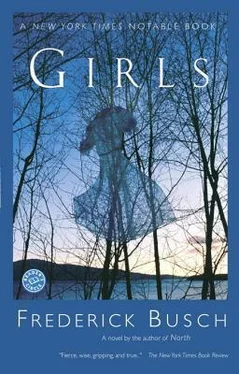Q: They value us because we do it for them? Sort of like a surrogate?
A: Yes. We do it with them — if you’re a good writer, you get your readers to care as you do about certain huge facts or factors that are at stake in your book. Big values: You’re worrying about love and death and need and all those huge abstractions. And the courtesy that good writers perform is to make them concrete, instead of abstract, through characters and events. And the courtesy readers perform is to permit writers to take them on that dark and sometimes frightening ride. Now, not only do I live in a dark part of the country and am, I guess, a man with a proclivity for those dark thoughts, but I was living here at a time when actual small human girls were being stolen from their safety and raped and murdered and eaten and butchered and God knows what happened to them. And I became inconsolably involved in the terrible loss that their families were going through, and I wanted to do something. This is all I could do. And that’s why I created a man like Jack, who at best would be clumsy and only get halfway near the bitter truth, because that was all I could do.
Q: You say that “serious” writing is writing that portrays the darker, more frightening side of life. Then you would agree with the person [Margaret Atwood] who said “A novel about unalloyed happiness would have to be either very short or very boring.”
A: I would argue that you can find fascinating happiness in the midst of sorrow. So she’s right. Her word “unalloyed” is the key … what makes us interesting to each other is the trouble we get each other in, just a little bit, and then the way we console each other.
Q: You said before you used the Colgate campus for the setting of this novel. How was that received by the Colgate community? Did you get any complaints?
A: I got a lot of questions; a lot of students and faculty tried to identify people in the book as belonging to the faculty. And I had to tell them — and this is the truth — that nobody in the book reflects anybody living or dead … except one person, who is a model of great human decency, and he has just retired as the head of the campus counseling service. He was the model for Archie. The other was Rosalie Piri — she came in part from a faculty person with that particular nose and mouth. I asked permission and she gave me permission to use those in the novel.
Q: You’re a very prolific author. What is your inspiration and how do you get started each time?
A: I’m one of those Jewish puritans — I feel like I have not earned my oxygen and food and water unless I’ve written, and so I try every day to make language — whether or not it’s a successful piece every day. I write essays, book reviews, and letters, I have a novel and short stories under contract. My life is writing. The professional life is writing and it flows into my teaching.
My home life is absolutely different. It involves Judy and me traveling or cooking or just talking — our boys are grown.… My poor kids were aware from their infancy that periodically every day the old man disappears from sight, and if he comes out surly it means he didn’t do so well, and if he comes out beaming it means it’ll be a better afternoon and evening. They called me “the bear” all through their childhood, because I’d come lurching and lumbering out of my writing room. I have a very nice writing room on the second floor of our barn across a field from our house. The house is a low, white farmhouse, with a white picket fence. We’re five miles from the nearest town on a small country road. The main part of the house was built about 1810. The rest has been added over the years. It sits all alone in the middle of about one hundred acres.
My first writing room was a bathroom in Greenwich Village … while Judy slept, I would put my portable typewriter on the toilet-seat cover and sit on the bathtub, and that’s where I wrote my first novel.
Q: What advice do you have for young and aspiring writers? Any secret tricks of the trade to share?
A: I think aspiring writers, young or old, ought to read all they can. If you don’t love to read, I cannot imagine that your imagination would be fed enough to write. That’s the first piece. Second piece: Assuming you have some talent — you can never grow it, or make it bigger — have enough courage to dare to look straight in the eye what your talent causes you to see. The most important component you can develop is energy, to get up at 5:30 in the morning. It’s hard work, brutally hard work. And it’s frustrating and you fail most of the time. Most of what a serious fiction writer does is fail. But in spite of rejection by yourself, your editors, agents, and readers — the first novel I published was the fourth I wrote — you have to keep going. That’s the hardest part. Finally, try to treat writing like skating on very thin ice: Keep moving or else you’ll fall in. And finally, finally: Don’t be precious, believe you’re writing to be read, believe in the needs and thoughtfulness of your reader, and honor your reader.
That’s it from Busch Central. That’s all I know.
Reading Group Questions and Topics for Discussion
1: The weather in Girls is severe and relentless. What role does this weather play in the novel, and why? What other books have you studied in which the weather was such a large part of the story? How do climate and landscape tend to affect the lives of individuals as well as larger societies?
2: Jack is a Vietnam veteran, a self-educated, blue-collar kind of guy. His wife, Fanny, is an emergency room nurse, a job requiring considerable education and training. In what ways do you think their differing backgrounds affect their relationship? Are these effects beneficial or damaging? What commonalities can you find in their backgrounds and/or jobs? Do you think these are sufficient to keep them together?
3: Did you want Jack and Fanny to get back together? Why or why not, and why do you think Busch arrived at the ending?
4: Do you think this book fits into the typical detective-novel genre? Why or why not? Why do you think readers like to categorize types of novels? Do you think Girls belongs to any distinct category or genre?
5: The first chapter directly follows the final chapter in chronology. Why do you think the author placed it at the beginning of the book? Did you go back and reread the first chapter after completing the novel? Did doing so alter your perception of the book? If so, how?
6: Why do you think Jack and Fanny couldn’t discuss the death of their baby after so much time? Has there ever been something you or someone you know couldn’t or wouldn’t discuss? Why do you think people close themselves away like that? How might people avoid doing so, or help each other overcome it?
7: In recent years there unfortunately have been many highly publicized cases of missing girls like Janice Tanner. Do you think these cases have always occurred and are just being played up by the media today? Or do you think something has shifted in our society that is causing an increase in such tragedies? Do you discuss these disappearances with your friends or your families? If so, how do you respond? Do you feel safe in modern society?
8: Jack lives in a world of extreme coldness, bleakness, and silence. It seems that the only lightness in his world is his nameless dog. Why do you think this is so? What function does the dog serve in the novel as a whole? In Jack’s life? What do you think the author had in mind when he chose to include the dog in this story?
9: When did you as a reader think you knew who was responsible for Janice Tanner’s disappearance? Who did you think did it, and why? Were you right?
Читать дальше










